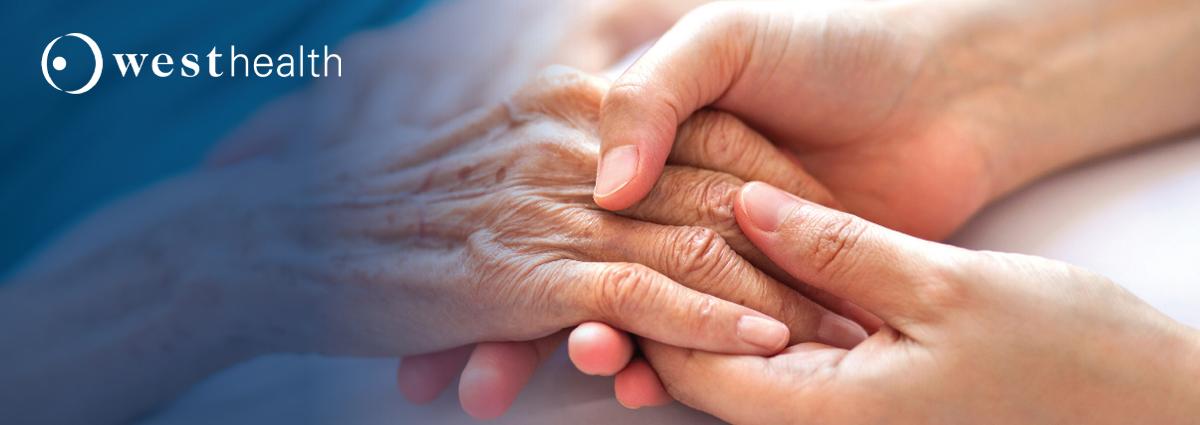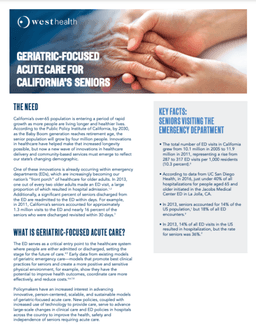Geriatric-Focused Acute Care for California’s Seniors
Transforming Geriatric Acute Care through Innovative Policy and Practice
September 11, 2018
Key Facts: Seniors Visiting The Emergency Department
The total number of ED visits in California grew from 10.1 million in 2005 to 11.9 million in 2011, representing a rise from 287 to 317 ED visits per 1,000 residents (10.3 percent).
According to data from UC San Diego Health, in 2016, just under 40% of all hospitalizations for people aged 65 and older initiated in the Jacobs Medical Center ED in La Jolla, CA.
In 2013, seniors accounted for 14% of the US population,1 but 18% of all ED encounters.
In 2013, 14% of all ED visits in the US resulted in hospitalization, but the rate for seniors was 36%.
The Need
California’s over-65 population is entering a period of rapid growth as more people are living longer and healthier lives. According to the Public Policy Institute of California, by 2030, as the Baby Boom generation reaches retirement age, the senior population will grow by four million people. Innovations in healthcare have helped make that increased longevity possible, but now a new wave of innovations in healthcare delivery and community-based services must emerge to reflect our state’s changing demographic.
One of these innovations is already occurring within emergency departments (EDs), which are increasingly becoming our nation’s “front porch” of healthcare for older adults. In 2013, one out of every two older adults made an ED visit, a large proportion of which resulted in hospital admission. Additionally, a significant percent of seniors discharged from the ED are readmitted to the ED within days. For example, in 2011, California’s seniors accounted for approximately
1.3 million visits to the ED and nearly 16 percent of the seniors who were discharged revisited within 30 days.
What Is Geriatric-Focused Acute Care?
The ED serves as a critical entry point to the healthcare system where people are either admitted or discharged, setting the stage for the future of care. Early data from existing models of geriatric emergency care—models that promote best clinical practices for seniors and create a more positive and sensitive physical environment, for example, show they have the potential to improve health outcomes, coordinate care more effectively, and reduce costs.
Policymakers have an increased interest in advancing innovative, person-centered, scalable, and sustainable models of geriatric-focused acute care. New policies, coupled with increased use of technology to provide care, serve to advance large-scale changes in clinical care and ED policies in hospitals across the country to improve the health, safety and independence of seniors requiring acute care.
West Health: Advancing Geriatric Emergency Care Policies
Advance state scope-of-practice policies that allow for specialty-trained professionals such as Emergency Medical Technicians or Home Health Aides to provide appropriate level acute care at home or in assisted living sites.
Advance state telehealth policies which expand originating sites to home, Emergency Management Systems, assisted living, and community-based settings for the delivery of specific acute care from a provider.
Advance state-based policies for transition of care from ED to community-based settings such as the Centers for Medicare & Medicaid’s Program of All-Inclusive Care for the Elderly (PACE).
Taking Action
Through a combination of applied medical research, policy and advocacy, and outcomes-based philanthropy, West Health is working to create and foster new integrated care models that improve health outcomes and better address both the medical and non-medical needs of seniors and their families. Our institute, policy center, and foundation all work together under the umbrella of West Health, with a shared mission to enable successful aging for our nation’s seniors.
Below are two examples of our research efforts in California:
In May 2016, the Gary and Mary West Foundation provided $11.8 million to UC San Diego to create a state-of-the-art senior emergency care unit to be housed within the ED at Jacobs Medical Center scheduled to open in late 2018. A multi-year medical research initiative in partnership with the West Health Institute is also underway at the ED to implement and study the impact of a comprehensive suite of screening tools and clinical protocols ranging from mental health, social work, medication management, and physical therapy to provide senior-specific care in the ED.
In 2017, the West Health Institute explored how new, more effective ways of delivering care could safely replace, when appropriate, hospital-based care with home-based alternatives that are more patient-centered, better matched to seniors’ needs and lower in cost. In collaboration with UC San Diego, West Health researched how the ED can identify the most appropriate patients for these alternatives-to-admission programs and their potential cost savings. Ultimately, 70 patients were enrolled in the Acute Care at Home study, 66 of whom avoided a hospitalization.
West Health and The SCAN Foundation’s “We Stand With Seniors…Will You?” public awareness and education campaign focuses on the specific challenges seniors and their families face in accessing high-quality, affordable healthcare, dental care and supportive services and the cost to the state if these challenges are not addressed.
Visit www.WeStandWithSeniors.org for more information. Keep up with #StandWithSeniors on social media via Facebook @WeStandWithSeniors and Twitter @WeStandWSeniors.
Downloads

WH-Policy-Brief-Acute-Care.pdf
Download